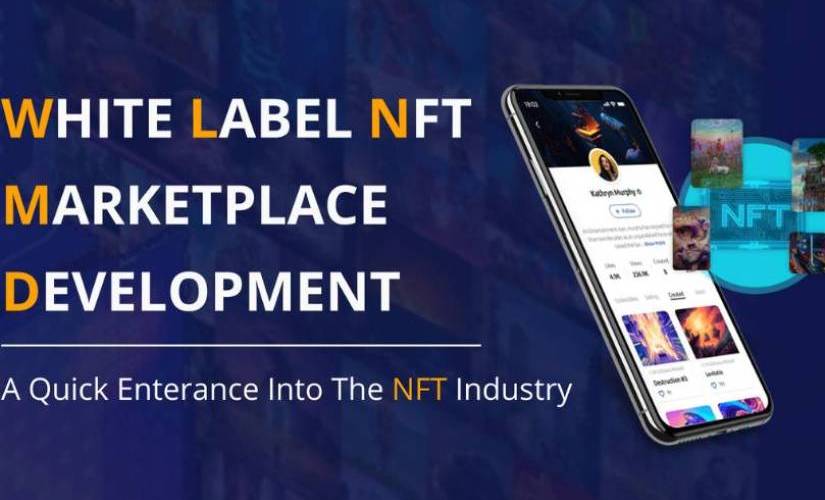What is White Label NFT Marketplace Development? With NFT sales soaring last year, the term has gone from being a vague and niche thing that only a few weird coders tossed around to becoming one of the most talked-about topics in the world. To facilitate and profit off of the NFT boom, several NFT marketplaces have sprung up, with some turning people into millionaires overnight.
With so many opportunities to explore, investors want to figure out and occupy various niches to spread their influence far and wide in this new and flourishing business — The White Label NFT Marketplace.
Now you might be wondering why you don’t see everyone scrambling to start NFT marketplaces if they are as profitable as they sound. The answer is simple: it’s very hard.
An NFT Marketplace Takes Months to Years to Develop
It takes months, if not years to fully develop an NFT marketplace from scratch, so forget about developing it on your own from your mother’s basement. You need a keen grasp of business strategies, as well as a ton of programming knowledge to even begin understanding what goes into NFT marketplace development.
This is where white-label NFT marketplace development comes in: to help individuals or small organizations set up their NFT business without needing to know all the technical stuff.
White Label NFT Marketplace — What Does That Even Mean?
White label software has been around for a long time, even before the advent of blockchain technology. The term refers to a product or service produced by one person or company that another person or company can rebrand as if they had made it. There have been thousands of businesses where the sole purpose is to supply white label software to other businesses.
So when the NFT marketplace development sphere started building momentum, these white-label suppliers were happy to extend a helping hand in the form of white label NFT marketplace development, which is what led to the hype you see now surrounding White Label NFT Marketplace Development.
The White Label Nft Marketplace Development Business Model
The biggest hurdle when trying to start an NFT marketplace is the development of the actual marketplace itself or finding the right people to get the job done.
White label development companies help people overcome this by building a team of developers who work full time, taking care of all the technical aspects, so clients can focus on the business side of things, resulting in a better product overall.
The company that developed the product then receives financial compensation for all its services. This business model is also extremely lucrative, with dozens of new white-label NFT marketplace development companies popping up every day.
Clone Script Development — Copies of Existing NFT Marketplaces but Customized
It is worth noting that in recent years, one specific niche within the white label NFT marketplace development sphere, called clone script development, has been on the rise. Clone scripts are copies of existing NFT marketplaces but can be customized by adding or removing features and functionalities to better suit the user’s requirements.
These clone scripts are popular because they feel familiar to people who have used the original marketplace on which the clone is based, making it easy for the users to transition from one to the other.
The Benefits of Using White Label Nft Marketplaces
Transparency: The white label NFT marketplaces are transparent and accessible by all the users, giving them the raw data with no room for alternate interpretations.
Security: One of the important aspects of the NFT business is safety. A strong multi-layered security system is commonplace in most White label NFT Marketplaces.
Decentralization: This is the main selling point of all top NFT marketplaces. Decentralization gets rid of any and all 3rd party involvement during transactions, thus keeping everything private.
Smart Contract: Smart contracts are responsible for defining the functionality and properties of the NFTs listed in the platform. Smart contracts form the core of any decentralized platform and eliminate inconsistencies and external involvement.
Customization: Another hallmark feature of white label NFT marketplace development is that they are highly customizable, letting users choose each and every feature they want, and the dev team makes it happen.
Next up, let’s talk about some of the functions and features for your business that are considered mandatory to check on the features and functionality.
Storefront is a mandatory feature that lists the details of the NFTs listed in the Marketplace. An informative and attractive storefront does wonders for user immersion and satisfaction.
The Filters and categories in your White label NFT Marketplace let the cataloged NFTs be sorted and categorized in order. You can also bring in advanced, user-friendly suggestions based on user data, enhancing the user experience through thoughtful innovations.
The Search option in your Marketplace can be supported with tagging and categories, while advanced search options allow users to get what they are looking for at a quicker pace.
The buy and bid facility is an important aspect that allows traders some flexibility regarding the pricing of their creations. These functions must be tightly coordinated in the platform, Where the buyers check on the functions like base prices, timing, highest bid, etc in real-time.
Last but not least, is Wallet integration. It is always a good idea to let your platform support multiple wallets like Metamask, MyEtherWallet, etc.
Which Industries do Whitelabel NFT Marketplace Development Companies Cater to?
Most White Label NFT Marketplace Development Companies serve various markets simultaneously. Six of the major markets that have benefited greatly by taking advantage of White Label NFT Services:
Art: Probably the community in which NFT marketplaces have had the biggest impact, as they Openly allow users to trade artworks without worrying about copyright infringement, art duplication, and theft.
Digital Collectables: By leveraging the digital asset tokenization capabilities offered by white label NFT marketplaces, blockchain technology has enabled easy ways to authenticate and verify the authenticity of digital collectibles, and even trace their ownership history.
Games: Piracy and exploits are commonplace in the gaming world. Thanks to the rise of NFT marketplaces, in-game assets can be safely transferred within supported ecosystems and ownership can be verified easily.
Music: Tokenization eradicates the risk of piracy of musical creations, seemingly putting an end to monetization issues that artists have been struggling to deal with since the early days of the industry.
Sports: As unlikely as it may seem, NFTs and sports go together seamlessly, enabling sports enthusiasts to buy or sell tokenized sports assets right from their favorite athletes or teams.
Other Industries
Real Estate: By seamlessly integrating legal ownership provisions into the traditional systems as a part of the blockchain, allowing land properties to be tokenized and listed on the market for sale.
Internet of Things (IoT): NFTs can help secure IoT networks by acting as a device authenticator by physically binding an NFT using physical unclonable functions (PUF) that enables the recovery of its blockchain account address (BCA).
Healthcare: As the healthcare industry becomes increasingly digitized, NFTs could allow personal health data to be tokenized, with the ability to choose which data people want to share or sell, and allow them to track how the data is used.
Live Events: Fake tickets have always been the bane of event promoters and fans who attend live events. But if tickets are turned into NFTs, their authenticity can be easily verified and by combining this with KYC policies, counterfeits can be abolished completely.
Advertising: This might sound weird, but it’s true. Collectors only see NFTs as collectibles and evaluate them based on their rarity. So if someone were to turn a rare moment in a game, for example, into an NFT and sell it for a million dollars, it indirectly promotes the game.
Conclusion
Now that we have gone over all of that, we are finally ready to answer the question “how did the white label NFT marketplace development hype start?”
The success of the white label development business model can be attributed mostly to
- The convenience of not having to worry about technical details
- The ease with which the software can be deployed
- It drastically reduces the cost of development and the time to launch
- The software is usually put through rigorous testing processes by the company that develops it, so you don’t have to worry about bugs and vulnerabilities.
- Multiple industries have started investing heavily into white label NFT marketplace development, and the developers have taken full advantage of this funding to create innovative ways to push the boundaries of what their software can do.
- The flexibility of the white label software, which is often designed to be modular so that features can be added or removed easily, makes it versatile and handy when dealing with a constantly evolving market.
The white label NFT marketplace development (clarisco dotcom) business is still pretty new, but thanks to the massive amounts of funding it is receiving, the business is progressing rapidly. Who knows what the landscape will look like in a year or two? The only certain thing is that blockchain technology has shaken up a lot of people’s lives.
Image Credit: Provided by the Author; Thank you!





